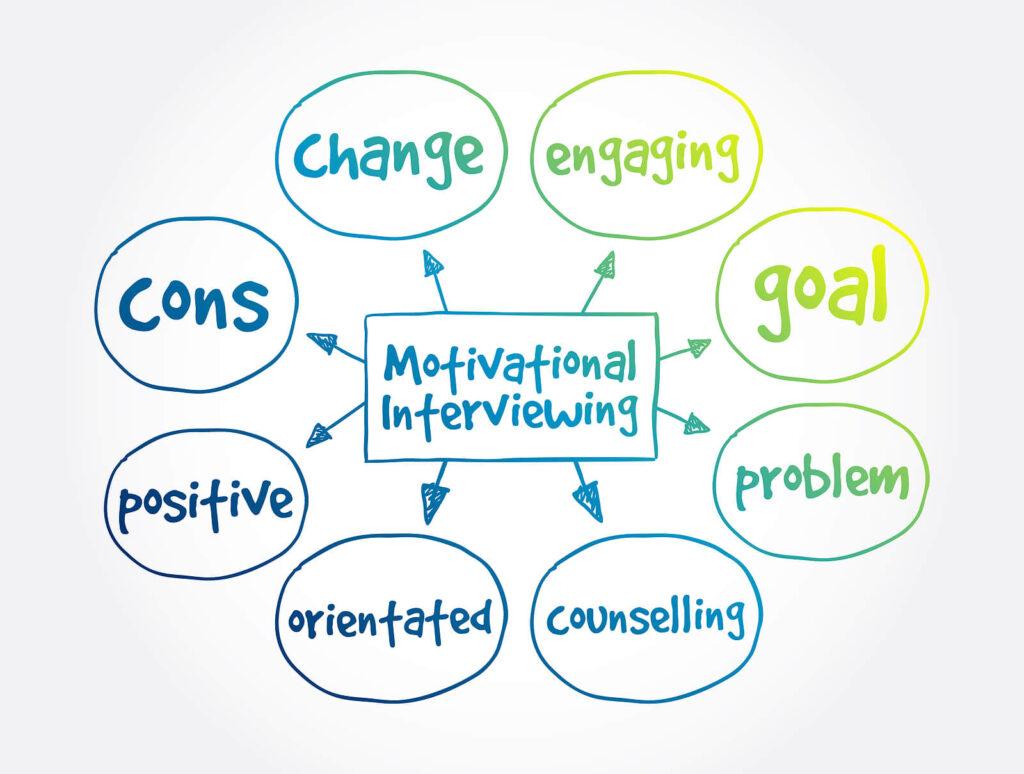Motivational Interviewing Addiction Psychotherapy
How Motivational Interviewing Can Help You Overcome Addiction
You’ve heard of motivational interviewing, but what does it mean and how can it help you? Motivational interviewing is an evidence-based therapy. It offers addiction treatment options that address the full range of behavioral and mental health disorders. These may include alcohol abuse and drug addiction. But, it’s more than just a method to help you quit drinking or taking drugs. It is also a philosophy of approaching life that can help you make positive changes in your life overall. This article will help you understand the stages of change as well as OARS and how to use motivational interviewing methods to get started on your path to recovery today.
Motivational Interviewing- The Basics
Motivational interviewing is a technique used by addiction counselors and therapists to help people who are addicted to drugs or alcohol, and those with other emotional problems. The addiction therapist will try to motivate the person toward recovery. Addiction psychiatrists use motivational interviewing techniques in the following stages of change:
- Pre-contemplation
- Contemplation
- Preparation
- Action
- And maintenance
The goal is to try and move their clients through the stages of change so they are more motivated about their own health and wellness. One way that this can be done is by asking open-ended questions. These will require more than one-word responses from the client. Some examples include: What does your work involve? What does it feel like when you’re drinking? Who was your best friend before you became an alcoholic?
The other way to motivate lasting change is the use of the OARS technique. OARS stands for Observe, Assess, Relate and Summarize (which sometimes includes Reframe). These four steps of motivational interviewing allow the counselor to get an understanding of how their client’s body reacts to substances they might be using. And, what emotions might be present.
Motivational Interviewing Defines The Addiction Issue
One of the more prominent methods of motivational interviewing is the stages of change model. This model helps you to clearly define where you are in your addiction. By doing so, you can get the most out of treatment with an addiction psychiatrist specially trained to use this powerful method. When one is in denial about their addiction, they may be in the pre-contemplation stage. If someone realizes that their addiction is harmful but does not have any desire to stop or make changes, they may be in contemplation. Motivational interviewing helps guide the patient through these stages of change. With the help of an addiction therapist, the patient has more sustained, fully internalized motivation to achieve lasting addiction recovery.
Where Are You In The Stages of Change?

What are the Stages of Change?
- Precontemplation: not considering a change at all
- Contemplation: weighing the pros and cons of change
- Preparation: getting ready to act on change
- Action: taking steps toward changing behavior (includes forming a plan and setting a date)
- Maintenance: maintaining the new behavior over time
- Termination or Relapse Prevention: ending old behaviors or preventing relapse to old behaviors.
What Are OARS?
These steps are meant to help people do an honest assessment of their behavior to determine what their relationship is with their addiction. These are the actual six steps that motivational interviewing uses for addiction recovery:
- Open
- Ask
- Reflect
- Summarize
- Express empathy and self-disclosure
- And offer an alternative
These are the steps used by Stephen Gilman, MD addiction psychiatrist in NYC to motivate his patients for lasting change. This process helps with SMART goal setting.
Set SMART Goals
The American Psychiatric Association and other addiction professionals recognize that patients who are committed to recovery should have SMART goals. Your goals should be focused on what you are willing and ready to commit to in the near future. An addiction psychiatrist using Motivational Interviewing will help you to set crystal clear and easily attainable goals that are:
- Specific
- Measurable
- Attainable
- Realistic
- Timely

Those suffering from addiction commonly fall into relapse because they focus on short-term goals or on strategies that don’t align with their values or recovery commitment. SMART goals help you to identify what’s most important to you and to develop strategies that are both consistent with your goals and necessary for reaching them. By determining which steps will bring you closer to a larger goal, you can develop a life plan for recovery success. The best way to ensure ongoing motivation is to create SMART recovery plans that are consistently monitored, re-evaluated, and adjusted when needed. With help from an addiction psychiatrist using motivational interviewing, setting smart goals is a great way to enhance your chance of achieving addiction recovery success.
Start Addiction Treatment in New York, NY
Working with an addiction therapist that understands each state of change can help you overcome the symptoms of addiction that affect you the most. I would be honored to offer support from my NYC, Manhattan-based practice. I am an addiction therapist in New York, NY with over 22 years of addiction treatment experience, and I’d be honored to help you. You can start your therapy journey by following these steps:
- Contact Stephen Gilman, MD
- Learn more about me and my approach to alcohol addiction treatment
- Start overcoming alcoholism in women
Other Services Offered with Stephen Gilman, MD – Addiction Psychiatrist in NYC, Manhattan
I am happy to offer a variety of addiction treatment services from my New York, NY-based practice. happy to provide a variety of services including young adult psychiatry, adult psychiatry, and opioid addiction treatment. I’m also happy to offer prescription drug addiction treatment, cocaine addiction treatment, meth addiction treatment, behavioral addiction treatment, PTSD treatment, drug addiction treatment, and marijuana addiction treatment. Learn more about me or visit my blog for more helpful info.




Trackbacks & Pingbacks
[…] you need to decrease the amount of alcohol you drink, I would be happy to offer support in overcoming addiction. As an online therapist in New York, NY, I have experience supporting clients with both in-person […]
Comments are closed.